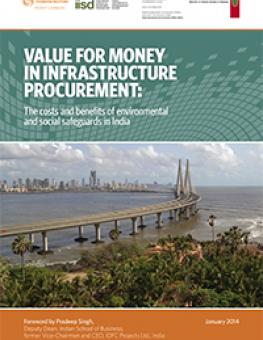
Value for Money in Infrastructure Procurement: The costs and benefits of environmental and social safeguards in India
This report debates the extent to which public-private partnerships (PPPs) are delivering value for money (VFM) in India.
While VfM is traditionally interpreted to mean the lowest-priced alternative at the time of commissioning, in the context of sustainable development it is understood as value for money across the asset life cycle. This approach embodies the principles of "total cost of ownership" and "whole-life value"—accounting for the costs of planning, designing, building, operating and maintaining an asset. It can therefore be used to account for the medium- and long-term efficiency gains and cost reductions enabled by sustainable infrastructure.
Our findings indicate that despite the best-in-class laws, policies, formal processes and institutional frameworks, PPPs in India might not be delivering VfM across asset life cycles. We make policy recommendations on how to improve the existing safeguards, on how to move beyond the existing safeguards, and on leveraging existing infrastructure development funds so as to lower the cost of capital for sustainable infrastructure.
You might also be interested in
Green Public Procurement in India
This report analyzes the status of green public procurement (GPP) in India and suggests key strategies for advancing sustainable procurement practices.
A Sustainable Asset Valuation of Non-Motorized Transport in Coimbatore, India
A Sustainable Asset Valuation (SAVi) of the economic, social, and environmental benefits of a non-motorized transport (NMT) network in Coimbatore, India.
Sustainable Asset Valuation (SAVi) of a Public Bicycle Sharing System in Dwarka, New Delhi, India: A focus on the environmental, social and economic impacts of non-motorized transport infrastructure
This SAVi assessment values the environmental, social and economic benefits generated by a public bicycle sharing system. Its results demonstrate how the transport system delivers to sustainable mobility targets in Delhi.
Increased Support Needed to Achieve India's Clean Energy Goals
India is on track to achieve many of its 2030 clean energy goals but needs to step up government support measures to accelerate the deployment of offshore wind, electric vehicles, and green hydrogen, according to a new report.